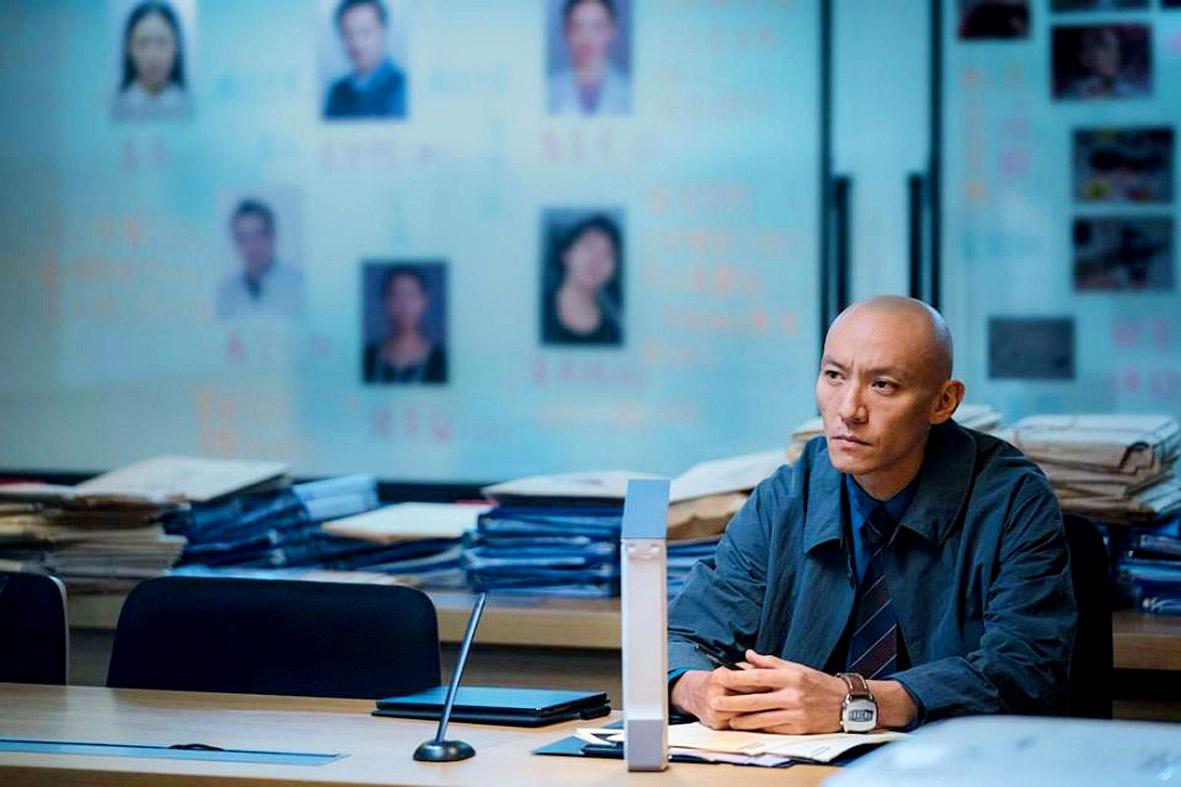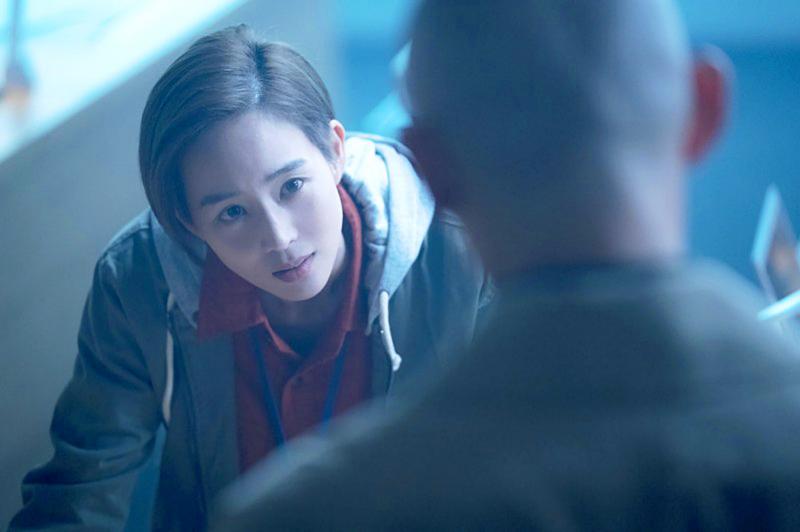With twist after twist and suspenseful, nuanced storytelling, The Soul (緝魂) makes full use of its 130 minute running time. Whenever things seem to be wrapping up, there’s always something else in store — all the way up to the very last scene, but in a way that makes sense and isn’t too confusing.
Helmed by The Tag-Along (紅衣小女孩) series director Cheng Wei-hao (程偉豪), this mystery thriller has his fingerprints all over it with similarly subdued cold tones and Taoist-based supernatural elements. Set in 2031 Taipei, however, this film adds futuristic, sci-fi components to the mix to create a grim yet technologically-advanced cityscape devoid of warmth. It feels slightly dystopian, and the fact that the audience barely gets to see this world outside of the police station, hospital, criminal court and crime scenes, only adds to this unsettling atmosphere.
Gone are the jump scares and spine-tingling moments; instead the film moves at a deliberately moderate pace, just slow enough for each detail to sink in before the next surprise. This isn’t horror. The Soul is purely focused on unraveling the mystery behind the murder of business mogul Wang Shih-tsung (Samuel Ku, 古斌), who is found murdered in the opening scene with a cursed Taoist-based method that would send his soul to eternal hell. All signs point to his mentally unstable son (Erek Lin, 林暉閔), who harbors a deep grudge against his father for neglecting his mother, but other suspicious characters close to Wang suggest that there’s something much deeper and sinister.

Photo courtesy of Vie Vision Pictures
An emaciated, frail Chang Chen (張震), who shed 24kg within three months for the role, enters the fray as the city’s top prosecutor, A-Chao. Despite being stricken with cancer, he spends the whole film getting to the convoluted bottom of what really happened as his health deteriorates. Chang’s harsh appearance and mannerisms fit perfectly with the bleak tones of the film, and his sublime acting really brings his complex character to life and serves as the engine that propels the movie.
A-Chao’s pregnant wife A-Bao (Janine Chang, 張鈞甯) also pulls her punches (literally), not just as a prominent member of the city’s criminal investigative unit but also as a loving partner who brings out the softer side of A-Chao that nobody else sees. The two mesh well together on screen as both lovers and coworkers, giving some tenderness to this uninviting city.
As they try to unravel the tangled web between Wang (who was also dying from cancer), his son, his ex-wife (Zhang Baijia, 張柏嘉), his current wife Li Yan (Sun Anke, 孫安可) and the corporation’s top scientist Dr Wan (Christopher Lee, 李銘順), things keep getting stranger and more intriguing, keeping the audience engaged throughout.

Photo courtesy of Vie Vision Pictures
While all have their acting chops down, Sun’s performance is especially layered and commendable.
There’s too much going in the plot to go into more without further spoiling it, but ultimately, the story is still about the humanity and relationships that drive the characters’ decisions. How far would one go for someone they love? This is the unifying theme that no character gets to avoid in this movie, no matter which side they’re on, and a decision they have to make for themselves.
And that’s what makes the movie so powerful. As each layer of the mystery is peeled off, it’s not just the criminal details that are revealed, but also aspects of the characters that they spend the entire movie trying to hide.
That’s all that really can be said. Just go watch the movie, it’s worth your time.

On April 26, The Lancet published a letter from two doctors at Taichung-based China Medical University Hospital (CMUH) warning that “Taiwan’s Health Care System is on the Brink of Collapse.” The authors said that “Years of policy inaction and mismanagement of resources have led to the National Health Insurance system operating under unsustainable conditions.” The pushback was immediate. Errors in the paper were quickly identified and publicized, to discredit the authors (the hospital apologized). CNA reported that CMUH said the letter described Taiwan in 2021 as having 62 nurses per 10,000 people, when the correct number was 78 nurses per 10,000

As we live longer, our risk of cognitive impairment is increasing. How can we delay the onset of symptoms? Do we have to give up every indulgence or can small changes make a difference? We asked neurologists for tips on how to keep our brains healthy for life. TAKE CARE OF YOUR HEALTH “All of the sensible things that apply to bodily health apply to brain health,” says Suzanne O’Sullivan, a consultant in neurology at the National Hospital for Neurology and Neurosurgery in London, and the author of The Age of Diagnosis. “When you’re 20, you can get away with absolute

May 5 to May 11 What started out as friction between Taiwanese students at Taichung First High School and a Japanese head cook escalated dramatically over the first two weeks of May 1927. It began on April 30 when the cook’s wife knew that lotus starch used in that night’s dinner had rat feces in it, but failed to inform staff until the meal was already prepared. The students believed that her silence was intentional, and filed a complaint. The school’s Japanese administrators sided with the cook’s family, dismissing the students as troublemakers and clamping down on their freedoms — with

As Donald Trump’s executive order in March led to the shuttering of Voice of America (VOA) — the global broadcaster whose roots date back to the fight against Nazi propaganda — he quickly attracted support from figures not used to aligning themselves with any US administration. Trump had ordered the US Agency for Global Media, the federal agency that funds VOA and other groups promoting independent journalism overseas, to be “eliminated to the maximum extent consistent with applicable law.” The decision suddenly halted programming in 49 languages to more than 425 million people. In Moscow, Margarita Simonyan, the hardline editor-in-chief of the